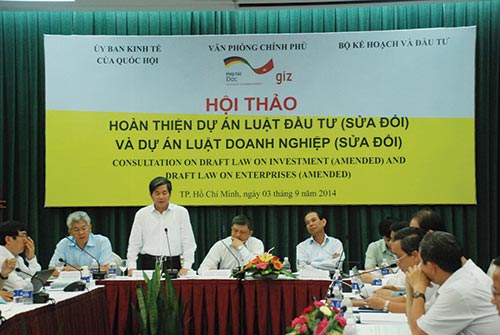Debate rages over sectorial “blacklist”

The list of conditional and preferred sectors, as well as incentives, are a hot topic among NA leaders
Deputy head of the National Assembly delegation from Gia Lai province Huynh Thanh said at a workshop held by the lawmaking body’s Economic Committee, the Government Office and the Ministry of Planning and Investment last week, that many investors had put their support behind the revised list of prohibited and conditional sectors.
The prime minister has urged ministries to urgently review and cut down the list to ensure the amended law is passed by the end of this year.
The current list of prohibited and conditional businesses has proved a barrier to the entry of some private enterprises. It has forced them to deal with numerous licences and sub-licences.
The new list is expected to facilitate the development of private enterprise and attract more foreign direct investment into the country.
Regarding incentives, Thanh suggested that the amended Investment Law should provide more to investors entering remote areas and employing local workers.
“These investors should be on the list of those eligible to receive incentives,” Thanh said.
Minister of Planning and Investment Bui Quang Vinh said the amended draft Investment Law was primarily aimed at improving Vietnam’s investment environment.
The existing Investment Law – which was issued in 2005 – fails to define exactly what sectors foreign investors are allowed to involve in. Furthermore, the law fails to satisfy some of Vietnam’s commitments in current and upcoming free trade agreements.
The Economic Committee under the National Assembly in a recent report agreed that the amendment was needed to create a comprehensive legal framework for the business community.
One noteworthy regulation in the draft is that foreign investors would no longer need investment certificates, except for projects in conditional sectors and those directly approved by the National Assembly or prime minister. However, foreign investors can still request an investment certificate be granted to them.
Vinh said the move was aimed at simplifying investment procedures for foreign investors, as many currently have to wait a long time to get certificates from local authorities. The Economic Committee assumed the government could still manage foreign investment projects without the granting of investment certificates.
However, Nguyen Hung Quang, managing partner of NHQuang and Associates law firm said there should be a specific regulation on revoking projects.
Vinh admitted that “we have built a mechanism to grant investment licences, but we still lack specific regulations on revoking them.”
For years the lack of clarity on revoking investment licences has plagued provincial authorities that are burdened with delayed projects.
What the stars mean:
★ Poor ★ ★ Promising ★★★ Good ★★★★ Very good ★★★★★ Exceptional
Latest News
More News
- NAB Innovation Centre underscores Vietnam’s appeal for tech investment (January 30, 2026 | 11:16)
- Vietnam moves towards market-based fuel management with E10 rollout (January 30, 2026 | 11:10)
- Vietnam startup funding enters a period of capital reset (January 30, 2026 | 11:06)
- Vietnam strengthens public debt management with World Bank and IMF (January 30, 2026 | 11:00)
- PM inspects APEC 2027 project progress in An Giang province (January 29, 2026 | 09:00)
- Vietnam among the world’s top 15 trading nations (January 28, 2026 | 17:12)
- Vietnam accelerates preparations for arbitration centre linked to new financial hub (January 28, 2026 | 17:09)
- Vietnam's IPO market on recovery trajectory (January 28, 2026 | 17:04)
- Digital economy takes centre stage in Vietnam’s new growth model (January 28, 2026 | 11:43)
- EU Council president to visit Vietnam amid partnership upgrade (January 28, 2026 | 11:00)
















 Mobile Version
Mobile Version